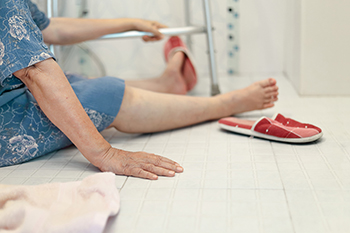Connect With Us
Blog
Items filtered by date: December 2021
Various Causes of Heel Pain
Podiatrists treat many types of disorders that cause pain in various parts of the heel. The most common heel pain is caused by plantar fasciitis (inflammation of the plantar fascia tissue), which causes pain on the bottom of the foot. Other common sources of heel pain include a calcaneal (heel bone) fracture, heel pad syndrome (a wearing down of the cushion on the bottom of the heel), nerve entrapment, including tarsal tunnel syndrome (which can also cause tingling, numbness or burning), neuromas (nerve swelling), and Achilles tendinopathy (damage to the tendon that attaches to the heel bone). Growing children may also be prone to Sever’s disease, which is irritation in the growth plate of the heel. If you have heel pain, it is suggested that you see a podiatrist. They will typically begin their evaluation by asking where the pain is located in the heel, along with medical history questions, followed by a physical examination. They may also use various diagnostic tools to determine the underlying cause of your heel pain and how best to treat it.
Many people suffer from bouts of heel pain. For more information, contact Dr. Rouder of S.I. Podiatry. Our doctor can provide the care you need to keep you pain-free and on your feet.
Causes of Heel Pain
Heel pain is often associated with plantar fasciitis. The plantar fascia is a band of tissues that extends along the bottom of the foot. A rip or tear in this ligament can cause inflammation of the tissue.
Achilles tendonitis is another cause of heel pain. Inflammation of the Achilles tendon will cause pain from fractures and muscle tearing. Lack of flexibility is also another symptom.
Heel spurs are another cause of pain. When the tissues of the plantar fascia undergo a great deal of stress, it can lead to ligament separation from the heel bone, causing heel spurs.
Why Might Heel Pain Occur?
- Wearing ill-fitting shoes
- Wearing non-supportive shoes
- Weight change
- Excessive running
Treatments
Heel pain should be treated as soon as possible for immediate results. Keeping your feet in a stress-free environment will help. If you suffer from Achilles tendonitis or plantar fasciitis, applying ice will reduce the swelling. Stretching before an exercise like running will help the muscles. Using all these tips will help make heel pain a condition of the past.
If you have any questions please contact our office located in Staten Island, NY . We offer the newest diagnostic and treatment technologies for all your foot and ankle needs.
What Do Podiatrists Do?
Podiatrists are physicians, and often surgeons, who have studied the foot, ankle, and lower leg, along with all associated ailments. They have received an undergraduate degree as well as medical degree and undergo four years of postgraduate study with a three-year residency. They treat a variety of foot and ankle issues, including fungal and ingrown toenails, heel pain, fractures, ankle sprains and strains, nerve damage (neuromas), bunions, hammertoe, arthritis, wound care, and complications of the feet due to diabetes and peripheral artery disease, and much more. They can also perform surgeries to treat certain foot and ankle conditions, perform gait analyses, and fit and create custom orthotics for their patients. If you experience any discomfort in your feet or ankles or are having a hard time getting around, make an appointment with a podiatrist who can get to the bottom of your condition and treat it accordingly.
Wound care is an important part in dealing with diabetes. If you have diabetes and a foot wound or would like more information about wound care for diabetics, consult with Dr. Rouder from S.I. Podiatry. Our doctor will assess your condition and provide you with quality foot and ankle treatment.
What Is Wound Care?
Wound care is the practice of taking proper care of a wound. This can range from the smallest to the largest of wounds. While everyone can benefit from proper wound care, it is much more important for diabetics. Diabetics often suffer from poor blood circulation which causes wounds to heal much slower than they would in a non-diabetic.
What Is the Importance of Wound Care?
While it may not seem apparent with small ulcers on the foot, for diabetics, any size ulcer can become infected. Diabetics often also suffer from neuropathy, or nerve loss. This means they might not even feel when they have an ulcer on their foot. If the wound becomes severely infected, amputation may be necessary. Therefore, it is of the upmost importance to properly care for any and all foot wounds.
How to Care for Wounds
The best way to care for foot wounds is to prevent them. For diabetics, this means daily inspections of the feet for any signs of abnormalities or ulcers. It is also recommended to see a podiatrist several times a year for a foot inspection. If you do have an ulcer, run the wound under water to clear dirt from the wound; then apply antibiotic ointment to the wound and cover with a bandage. Bandages should be changed daily and keeping pressure off the wound is smart. It is advised to see a podiatrist, who can keep an eye on it.
If you have any questions, please feel free to contact our office located in Staten Island, NY . We offer the newest diagnostic and treatment technologies for all your foot care needs.
Falling: Causes and Prevention
Falls are a leading cause of injury among older adults. In fact, every year a third of all Americans aged 65 or older experience a fall. Falls among the elderly can cause serious injury and mobility issues, as well as damage to their self-esteem and independence. Falls are typically caused by muscle weakness, mobility or balance issues, the side-effects of a medication, or the fear of falling. The best way to prevent falls is to exercise regularly, implement specific measures to make the home environment safer, manage medications, and maintain proper foot and ankle health. For more information about preventing falls, please consult with a podiatrist.
Preventing falls among the elderly is very important. If you are older and have fallen or fear that you are prone to falling, consult with Dr. Rouder from S.I. Podiatry. Our doctor will assess your condition and provide you with quality advice and care.
Every 11 seconds, an elderly American is being treated in an emergency room for a fall related injury. Falls are the leading cause of head and hip injuries for those 65 and older. Due to decreases in strength, balance, senses, and lack of awareness, elderly persons are very susceptible to falling. Thankfully, there are a number of things older persons can do to prevent falls.
How to Prevent Falls
Some effective methods that older persons can do to prevent falls include:
- Enrolling in strength and balance exercise program to increase balance and strength
- Periodically having your sight and hearing checked
- Discuss any medications you have with a doctor to see if it increases the risk of falling
- Clearing the house of falling hazards and installing devices like grab bars and railings
- Utilizing a walker or cane
- Wearing shoes that provide good support and cushioning
- Talking to family members about falling and increasing awareness
Falling can be a traumatic and embarrassing experience for elderly persons; this can make them less willing to leave the house, and less willing to talk to someone about their fears of falling. Doing such things, however, will increase the likelihood of tripping or losing one’s balance. Knowing the causes of falling and how to prevent them is the best way to mitigate the risk of serious injury.
If you have any questions, please feel free to contact our office located in Staten Island, NY . We offer the newest diagnostic and treatment technologies for all your foot care needs.
Are You Suffering From Ingrown Toenails?
The Importance of Foot Care for Diabetic Patients
 Patients who have diabetes may experience a variety of foot related complications, and in severe cases those complications can lead to amputation. Because diabetes can cause patients to lose sensation in their feet, noticing problems can become very difficult. Diabetes can cause poor blood flow, a slowdown of healing in wounds on the feet, and an increased numbness of the feet and toes. This is why establishing a foot-care action plan with a podiatrist, as well as scheduling regular checkups is suggested. Some things that can be implemented daily include checking for wounds or sores, washing and drying the feet thoroughly, and protecting the feet with properly fitting footwear. A podiatrist will also be able to help treat wounds on the feet, as well as provide guidance on shoes specifically designed for diabetic patients.
Patients who have diabetes may experience a variety of foot related complications, and in severe cases those complications can lead to amputation. Because diabetes can cause patients to lose sensation in their feet, noticing problems can become very difficult. Diabetes can cause poor blood flow, a slowdown of healing in wounds on the feet, and an increased numbness of the feet and toes. This is why establishing a foot-care action plan with a podiatrist, as well as scheduling regular checkups is suggested. Some things that can be implemented daily include checking for wounds or sores, washing and drying the feet thoroughly, and protecting the feet with properly fitting footwear. A podiatrist will also be able to help treat wounds on the feet, as well as provide guidance on shoes specifically designed for diabetic patients.
Diabetic foot care is important in preventing foot ailments such as ulcers. If you are suffering from diabetes or have any other concerns about your feet, contact Dr. Rouder from S.I. Podiatry. Our doctor can provide the care you need to keep you pain-free and on your feet.
Diabetic Foot Care
Diabetes affects millions of people every year. The condition can damage blood vessels in many parts of the body, especially the feet. Because of this, taking care of your feet is essential if you have diabetes, and having a podiatrist help monitor your foot health is highly recommended.
The Importance of Caring for Your Feet
- Routinely inspect your feet for bruises or sores.
- Wear socks that fit your feet comfortably.
- Wear comfortable shoes that provide adequate support.
Patients with diabetes should have their doctor monitor their blood levels, as blood sugar levels play such a huge role in diabetic care. Monitoring these levels on a regular basis is highly advised.
It is always best to inform your healthcare professional of any concerns you may have regarding your feet, especially for diabetic patients. Early treatment and routine foot examinations are keys to maintaining proper health, especially because severe complications can arise if proper treatment is not applied.
If you have any questions please feel free to contact our office located in Staten Island, NY . We offer the newest diagnostic and treatment technologies for all your foot and ankle needs.
Read more about Diabetic Foot Care



